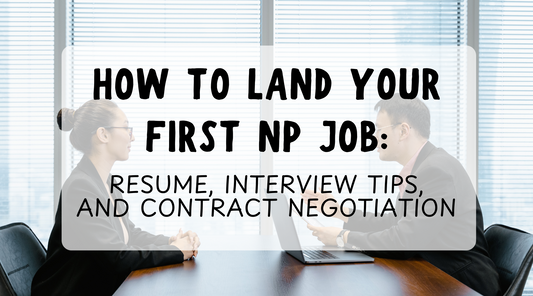When it comes to finding the right Nurse Practitioner (NP) role, the job fit can significantly impact your career satisfaction and success. The interview process is not just about impressing the employer; it's also about making sure that the job aligns with your career goals and values. Asking an insightful question during the interview will give you a deeper understanding of the position and the organization, helping you make an informed decision if you receive an offer. Here are 10 options to pick from for when they ask "Do you have any questions for us?"
Though some of your questions might be covered throughout the interview, it’s still crucial to ask a few specific questions directly to ensure you have all the information needed before accepting a job offer or proceeding with the interview process.
Top 10 Questions to Ask During Your Nurse Practitioner Interview
1. What resources or support systems are in place to help new hires succeed in this organization?
It’s essential to understand what kind of onboarding and mentorship you'll receive. An organization that invests in resources like training programs, shadowing opportunities, or access to mentorship demonstrates their commitment to your success.
2. Why are you looking to hire a Nurse Practitioner for this role?
This question gives you insight into the specific needs the organization has, and whether they are looking for support to meet growing demand, fill gaps in care, or reduce physician workload. Understanding the motivation behind the hire can give you a better sense of the role’s expectations.
3. What does a typical workday look like for this role, and what is the expected workload?
Clarifying the day-to-day tasks and patient load will give you an idea of what to expect. Will the job be fast-paced with a high patient volume, or is it more focused on quality time with each patient? Understanding the daily structure helps set realistic expectations.
4. How does this organization support continuing education and professional development?
Since staying current in the healthcare field is crucial, knowing the organization’s approach to continuing education—whether they offer paid training, encourage attending conferences, or provide stipends for certifications—can be an important factor in your decision.
5. Can you describe the organizational structure of the unit or team?
Understanding how the team functions will help you know where the NP fits into the bigger picture. Is there a strong collaboration with physicians, other NPs, or support staff, and is there room for career progression in the unit or department?
6. What are the main challenges of this role, and how do you handle them?
No job is without its challenges. Asking about potential challenges, whether related to patient care, communication, or workflows, can help you assess if you’re equipped and comfortable facing those issues.
7. What do you enjoy most about working here?
This question helps gauge the interviewer’s perspective and assess the organization’s culture. Their response will offer a more personal insight into the company and what makes it a positive work environment for current staff.
8. How many Nurse Practitioners have held this job in the last 5 years?
It’s helpful to know how long employees typically stay in the role. High turnover may indicate possible issues within the position or workplace environment. Alternatively, a long tenure can suggest stability and satisfaction among team members.
9. Can you elaborate on the work schedule? Will I be expected to work weekends, holidays, or take on call shifts?
Clarifying the work-life balance is essential for maintaining your well-being. Understanding the expected schedule—including weekends, nights, or holiday shifts—will help you plan for a healthy balance between your professional and personal life.
10. How frequently will I meet with management or supervisors for feedback and support?
Regular feedback is a key component of professional development. Understanding how often management communicates with employees ensures you’ll receive the guidance and performance reviews necessary for growth in your role.
Why Asking Questions Matters
Asking these questions not only demonstrates your interest in the position, but it also reflects your proactive approach to making sure it’s the right job fit for you. Additionally, these questions can help uncover any red flags that might suggest challenges or inconsistencies within the organization that could affect your job satisfaction.
Being informed gives you confidence in your decision-making process—whether you're choosing between multiple job offers or determining if a role aligns with your long-term career goals.
Share Your Thoughts and Experiences
We’d love to hear from you! What have been some of the red flags you've encountered during interviews? Are there other insightful questions you’d add to this list that helped you when job hunting? Leave a comment below and join the conversation!



